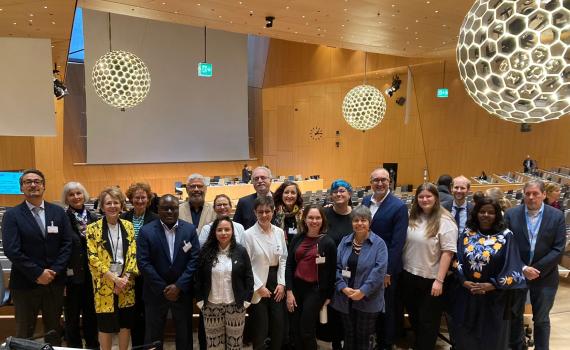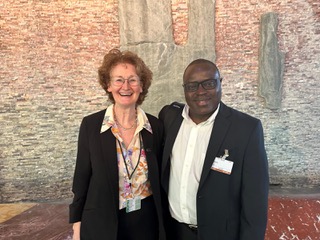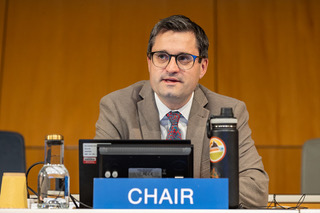
Teresa Hackett, EIFL Copyright and Libraries Programme Manager, summarizes the key outcomes and achievements from WIPO’s copyright committee (SCCR/44) that met in Geneva from 6 - 8 November 2023. EIFL was joined at SCCR by civil society allies from the global coalition on Access to Knowledge (A2K).
Significant progress was made on public interest issues in three key areas. New proposals on limitations and exceptions (L&Es) from the African Group and the United States received broad support from member states who agreed on activities and next steps for advancing work on L&Es. On L&Es in the draft broadcast treaty, it was decided that more work will be done to strike the right balance between protections for broadcast organizations and access to broadcast content, and on the topic ‘Copyright in the Digital Environment’, a work plan will be presented at the next SCCR.
While we were disappointed that the final version of the Toolkit on Preservation was not published as expected, the Secretariat announced that the toolkit will be finalized very soon.
Two new proposals on L&Es and agreement on the way forward
Two complementary new proposals framed discussions on the agenda item on limitations and exceptions.
Support for the African Group proposal
A proposal by the African Group for Implementation of the Work Program on Exceptions and Limitations (document SCCR/44/6) sets out a detailed process and methodology for implementing the L&E workplan adopted by the committee in March 2023 at SCCR/43.
The new proposal received a broad welcome from other regional groups. The Group of Latin American and Caribbean Countries (GRULAC) and the Group of Central Asian, Caucasus and Eastern European Countries (CACEEC) recognized the importance of access to knowledge, and the need to update L&Es for the digital environment. The Asia and the Pacific Group (APG), the Central European and Baltic States (CEBS) and Group B (30+ industrialized countries) looked forward to constructive discussions on implementation of the work plan, and China hoped that the proposal would provide a solid foundation for reaching a common understanding on the priorities. As a consensus based organization, it’s great to see cross-regional support at WIPO for work on L&Es, and a broad willingness to work together on the topic.
After extensive negotiations on the final day of the meeting, Member States tasked the Secretariat to prepare a detailed implementation plan with reference to the African Group proposal, and in consultation with member states (document SCCR/44/Summary by the Chair). The implementation plan will be presented at the next SCCR in April 2024. In addition, before the next SCCR, the Secretariat will organize an online panel discussion on cross-border uses of works for education and research for member states and observer organizations (such as EIFL).
EIFL thanks the African Group for its proposal that kickstarted action on implementing the L&E work programme. We are grateful to the Group for once again taking the initiative to help ensure that L&Es stay in focus and on track at SCCR (the work programme on L&Es, adopted at SCCR/43 in March 2023, also came from the Group).
Timely proposal for libraries, archives and museums by the United States
The proposal by the United States, ‘Updated Version of the Document “Objectives and Principles for Exceptions and Limitations for Libraries and Archives”’(document SCCR/44/5) updates an earlier version presented at SCCR in 2013 (the earlier version helped shape discussions on the so-called Chair’s Informal Chart on libraries and archives (document SCCR/34/5)).
The new proposal encourages member states to adopt carefully crafted exceptions and limitations that enable libraries, archives and museums to carry out their public missions, such as facilitating preservation, supporting research and scholarship, and providing public access to their digital collections. Expanded references to digital formats, digital preservation and digital access (on-the-premises and remote) reflect developments in digital technologies over the past decade, and changes in the ways that cultural heritage institutions deliver their services.
The U.S. proposal will be discussed further at the next SCCR. It complements the African Group proposal because it helps to implement certain activities in the L&E workplan (preparation of objectives and principles for consideration by the committee), and it provides an excellant starting point for intersessional work on the topic.
In addition, Prof Raquel Xalabarder presented her Study on the Challenges of Research Institutions and Research Purposes in Relation to Copyright (document SCCR/44/4). Comments on the study can be sent by email to <copyright.mail@wipo.int> by January 12, 2024.
Balanced approach to L&Es in the broadcast treaty
Limitations and exceptions also featured in the agenda item on the draft WIPO treaty for the protection of broadcast organizations. EIFL welcomed improvements to L&Es in the current draft text (document SCCR/44/3) - the addition of the words, “such as”, makes clear that the exceptions in Article 11 are illustrative examples of socially relevant provisions (rather than being a closed list). But the exceptions are still permissive: to guarantee access to copyright-protected content for social, educational and public interest reasons, the exceptions must in our view be binding. In his summary of the meeting, the Chair, Mr Owen Ripley, notes that striking the right balance in the approach to limitations and exceptions in the broadcast treaty remains an outstanding issue in the text.
However, an overarching problem is that the draft text appears to (still) extend to post-fixation activities, such as recording a broadcast programme. New rights of retransmission to the public (Article 6), fixation (Article 7) and transmission of stored programmes (Article 8) appear to step over the line into post-fixation territory, and they would surely affect libraries that use broadcast material in their collections for teaching, research and civic education.
In his summaries of both SCCR/43 and SCCR/44, the Chair states the common understanding in the committee that any new treaty should be narrowly focused on signal piracy and should not extend to any post-fixation activities. Finishing out his role as Chair, Mr Ripley has undertaken to work with the expert drafters to prepare a new text for presentation at the next meeting - we hope that the revised text will clarify and resolve this critical issue.
Copyright in the digital environment: music streaming and generative AI
Under the agenda item, “Other Matters”, GRULAC and Group B presented proposals related to copyright in the digital environment.
GRULAC’s proposal for an Analysis of Copyright Related to the Digital Environment (document SCCR/43/7) relates to music in the digital environment, in particular, remuneration of artists on global streaming platforms. GRULAC also requested having the topic, “Copyright in the Digital Environment”, as a stand-alone item on the agenda of SCCR to provide space for discussion of a wider range of hot topics, such as block chain and AI, that are having a profound effect on the global consumption and exploitation of creative works.
The proposal by Group B for an Information Session on Generative AI and Copyright (document SCCR/44/8) points to the increasing use of generative AI technology that is raising a range of important issues related to copyright, and gaining attention in other policy fora. The proposal includes in particular the use of copyright-protected content as training data for AI models and applications, and the legal status of AI-generated output.
As a result, GRULAC was invited to table a work plan on Copyright in the Digital Environment at the next SCCR, and the Secretariat will organize an information session on the opportunities and challenges of generative AI (as part of the agenda item related to Copyright in the Digital Environment).
SCCR in 2024: new dates and officers
The next SCCR meeting (SCCR/45) will take place in Geneva from April 15-19, 2024. At present, just one meeting is scheduled in 2024. (The number of WIPO committee meetings next year is curtailed to the scheduling of at least one diplomatic conference (to conclude a Design Law Treaty)). Therefore, the issue of intersessional meetings, as envisaged in the L&E work programme, become more prominent and we welcome the Chair’s invitation to member states and the Secretariat to clarify and confirm non-plenary sessions in 2024 (Chair’s Summary of SCCR/44).
Also, SCCR elected new officers for 2024: Adriana Moscoso del Prado (Spain) will become Chair and Vanessa Cohen (Costa Rica) and Peter Lábody (Hungary) will be Vice-Chairs. In 2025, the roles will swap around: Vanessa Cohen will be Chair, and Peter Lábody and Adriana Moscoso del Prado Vice-Chairs. This is the first time that the Standing Committee on Copyright and Related Rights will be chaired by a woman, and EIFL wishes the new officers a fruitful and successful term.
With an agreed framework for discussion of limitations and exceptions and other public interest issues at SCCR, as well as positive engagement from regional groups, the outlook for 2024 is bright!
Further information
- Read statements by EIFL at SCCR/44
- Summary by the Chair
- PIJIP: The Conclusions of SCCR 44
- Watch 'SCCR/44 Outcomes: Steps forward to a more balanced copyright system?' Members of the project on the Right to Research in International Copyright Law explain how SCCR/44 took major steps forward in achieving a fairer and more balanced copyright system. Watch on Youtube (English with Spanish subtitles) (7:36mins)
SCCR44 Outcomes: Steps forward to a more balanced copyright system?
SHARE / PRINT







